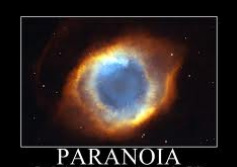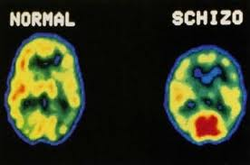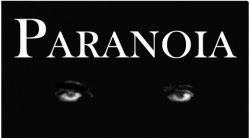Paranoia
What is it?

Ever feel like the universe is spying on you... It is
Ever have that feeling that someones watching you? It's a feeling that you can't quite shake and makes you jump at every noise. When you feel like everyone's out to get you, that your friends are in on it too. Here's the secret though: your just being paranoid. No one is out to get you. There isn't some big scam trying to rip you off or throw you under the bus. You are being paranoid. Dictionary.com defines paranoia as the "baseless or excessive suspicion of the motives of others." People can have a paranoid moment or episode, but often there are diseases that give you paranoid delusions that someone is out to get you. These diseases mess with your mind and can even warp your sense of reality. Paranoia can be a dangerous tool that may have a disastrous outcome. Diseases can be treated, plain out paranoia has no cure.
Schizophrenia

Schizophrenia is a disease that affects the minds ability to differentiate reality and fantasy. It makes it difficult to manage your emotions and to make decisions. Schizophrenia makes these people unable to relate to others or even to express themselves with others. Many symptoms include hallucinatuion, no expression, and inability to remember certain aspects of an incededent (such as color). Paranoia is another major symptom that plagues these people, making them think that treatment is unnecessary and that their own family is turning against them. The inability for these people to differentiate reality and fanatasy can sometimes be their ultimate downfall. The medication used to treat schizophrenia can have side effects that - depending on the person - can be pretty severe. It is unknown where the origin of this disease came from, but there is some speculation that the combination of enviornment and genes can be the cause.
Paranoid Personality Disorder
People with this disease cannot trust anyone. Men are most often plagued with this gene, making it more evidentiary that this disease may be genetic. This paranoia can come in bursts, but in some cases stays with the person at all times. It also makes it very difficult for the person to socialize or even maintain a friendship. Relationships mean that there is always the possibility that someone is out to get you and that you cannot trust anyone. Other sympotoms include detachment and hostility. This disease also makes it difficult to get treatment, seeing as you don't trus doctors enough to let them give you medicine that can have awful side effects. Even then, the person has to believe that it's going to work, that it's all worth it. This makes it very difficult to treat and can really interfere with their lives.
Different types of Paranoia

Paranoia acts differently with different people. It is unknown what chemical process takes place to create paranoia, or even what part of the brain is affected by paranoia. People experience paranoia in different forms: self-referential thinking, thought broadcasting, magical thinking, thought withdrawl, thought insertion, and ideas of reference. Self-referential thinking - from the point of view of the paranoid individual - can be defined as knowing people are talking about you. Anyone you see knows you did something or is talking badly about you. Thought broadcasting is when people can read your mind. Everyone knows what you are thinking and you can't escape into your own private thoughts. Magical thinking is the opposite idea of thought broadcasting: that you can control other people with your mind. They are paranoid that people will find out that it's them and that they will try and harm the paranoid person. Thought withdrawl is when the paranoid person believes that other people around them are stealing their thoughts. When people work in a competetive working environment, this paranoia can take a heavy toll on them, due to their ideas being stolen and someone else getting the credit for them. Thought insertion is exactly what it sounds like: thoughts being put into your head. Not only can you not trust others, but you can't even trust yourself. And finally ideas of reference pertains to the idea that the television or other forms of media are directly addressing the paranoid individual.
Paranoia's connection to secrecy
Paranoia is essentially the fear of secrets. Secrets are information hidden from others, exactly what a paranoid individual is afraid of. Secrets can have a profound effect on those that are keeping them. Depending on the secret, a person may be in danger if that secret gets out. The types of paranoia's listed above show how someone may be able to ascertain those secrets and can even show why a person might be paranoid. If a secret such as being a spy, or even a re-located person, got out, lives could be in danger. You look around to see people glancing at you from the corner of your eye. You can't be sure, but you think you've seen that person pass by you twice already. These secrets twist your mind into thinking that everyone knows your secret. Secrets can drive people crazy, make them unable to focus on anything but the kind of information they know, and what people will do to them if they find out. This paranoia, if out of hand, can make the secret almost not worth it.
Resources:
Websites -
Treatment., Learning. Paranoia. "Paranoia | Define Paranoia at Dictionary.com." Dictionary.com | Free Online Dictionary for English Definitions. Based on the Random House Dictionary, © Random House, Inc. 2011, 2011. Web. 27 Apr. 2011. <http://dictionary.reference.com/browse/paranoia>.
Duckworth, Ken. "Schizophrenia | NAMI Michigan – Michigan's Voice on Mental Illness." NAMI Michigan | Michigan's Voice on Mental Illness. Michigan University, Feb. 2007. Web. 27 Apr. 2011. http://www.namimi.org/schizophrenia?gclid=CNiTiL7ut6gCFYwH2godjR_wDQ.
"Paranoid Personality Disorder - PubMed Health." Paranoid Personality Disorder. A.D.A.M. PubMed Health, 14 Nov. 2010. Web. 27 Apr. 2011. <http://www.ncbi.nlm.nih.gov/pubmedhealth/PMH0001934/>.
De-Witt, Rosalyn. "Paranoia - Dose, Causes, Therapy, Withdrawal, Drug, Person, People, Medication." Encyclopedia of Mental Disorders. Encyclopedia of Mental Disorders. Web. 27 Apr. 2011. <http://www.minddisorders.com/Ob-Ps/Paranoia.html>.
Images -
Google Images." Google. Thrust Recording Music Inc, 2008. Web. 27 Apr. 2011. <http://www.google.com/imgres?imgurl=http://www.thrustrecordingsmusic.com/SonicSphereMusicSUB/images/ParanoiaFRONT.jpg>.
"Google Images." Google. PubMed Health. Web. 27 Apr. 2011. http://www.google.com/imgres?imgurl=http://www.clivir.com/pictures/schiz/schizo.jpg.
Websites -
Treatment., Learning. Paranoia. "Paranoia | Define Paranoia at Dictionary.com." Dictionary.com | Free Online Dictionary for English Definitions. Based on the Random House Dictionary, © Random House, Inc. 2011, 2011. Web. 27 Apr. 2011. <http://dictionary.reference.com/browse/paranoia>.
Duckworth, Ken. "Schizophrenia | NAMI Michigan – Michigan's Voice on Mental Illness." NAMI Michigan | Michigan's Voice on Mental Illness. Michigan University, Feb. 2007. Web. 27 Apr. 2011. http://www.namimi.org/schizophrenia?gclid=CNiTiL7ut6gCFYwH2godjR_wDQ.
"Paranoid Personality Disorder - PubMed Health." Paranoid Personality Disorder. A.D.A.M. PubMed Health, 14 Nov. 2010. Web. 27 Apr. 2011. <http://www.ncbi.nlm.nih.gov/pubmedhealth/PMH0001934/>.
De-Witt, Rosalyn. "Paranoia - Dose, Causes, Therapy, Withdrawal, Drug, Person, People, Medication." Encyclopedia of Mental Disorders. Encyclopedia of Mental Disorders. Web. 27 Apr. 2011. <http://www.minddisorders.com/Ob-Ps/Paranoia.html>.
Images -
Google Images." Google. Thrust Recording Music Inc, 2008. Web. 27 Apr. 2011. <http://www.google.com/imgres?imgurl=http://www.thrustrecordingsmusic.com/SonicSphereMusicSUB/images/ParanoiaFRONT.jpg>.
"Google Images." Google. PubMed Health. Web. 27 Apr. 2011. http://www.google.com/imgres?imgurl=http://www.clivir.com/pictures/schiz/schizo.jpg.
